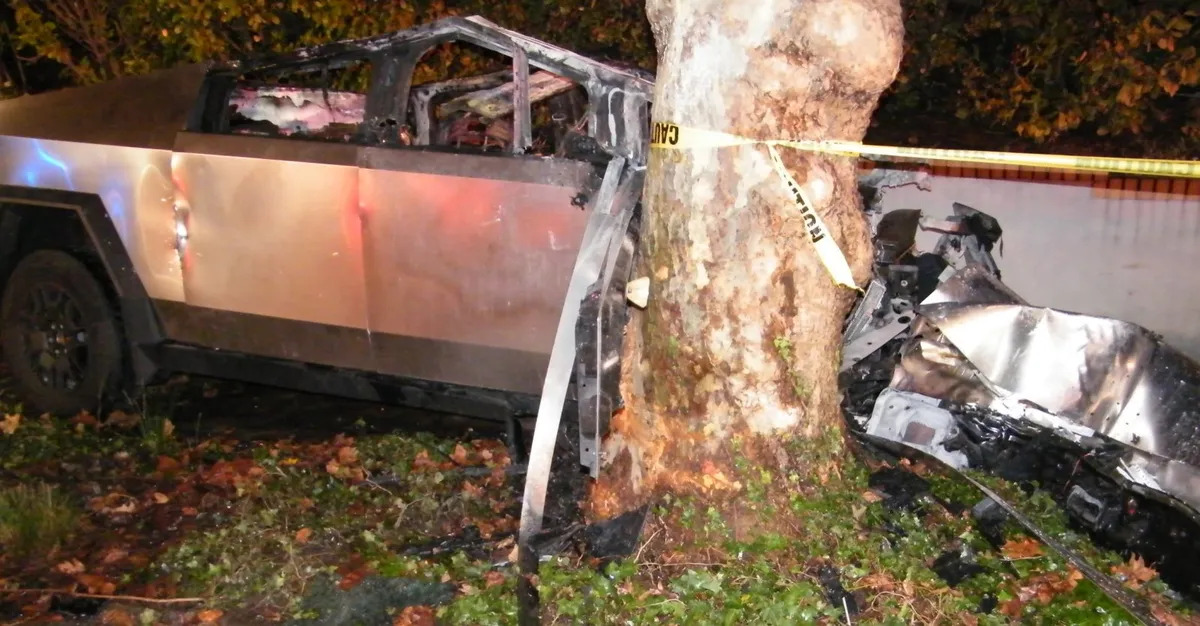
Two families from the Bay Area have initiated legal action against Tesla following the tragic deaths of their children—19-year-old Krysta Tsukarahara and 20-year-old Jack Nelson—along with their friend Soren Dixon, who was also 20. The lawsuit stems from a devastating crash that occurred on Thanksgiving Eve in 2024 in Piedmont, California. The incident involved a Tesla Cybertruck that crashed into a tree and wall, tragically resulting in a fire that left the passengers trapped inside the vehicle.
According to the lawsuit, the crash caused the Cybertruck’s electronic door handles to malfunction, preventing the occupants from escaping. Surveillance footage released by the California Highway Patrol captured the vehicle’s final moments, showing it speeding around a curve before losing control as it crested a hill. The video also revealed a large flash, indicating the onset of a fire shortly after the crash.
A friend who was following the Cybertruck attempted to rescue the trapped passengers by breaking the front passenger window, reportedly striking it “ten to fifteen times” with a fallen tree branch. While he managed to pull one person out, the other three tragically succumbed to asphyxiation from smoke inhalation and suffered burns on their bodies.
Initial post-crash investigations revealed that the three college students had been under the influence of alcohol during the incident, which took place on a night notorious for drunk driving. After the crash, Tsukarahara's family filed a lawsuit against Dixon's estate, the driver of the vehicle, and later amended their case to include Tesla as a defendant. They argue that the vehicle’s design played a crucial role in their daughter’s death, specifically citing the difficult-to-operate door handles that hindered rescue efforts.
Nelson's family has also filed a separate lawsuit, echoing similar allegations against Tesla regarding the design flaws that contributed to the fatalities.
Tesla vehicles feature electronic door handles that are flush with the exterior, which not only enhances the aesthetic appeal but also presents operational challenges, especially in emergencies. Each model released has had varying door handle designs, leading to confusion about their operation. In the case of the Cybertruck, the rescuer faced significant difficulty accessing the vehicle and had to resort to repeatedly smashing the window to reach the trapped passengers.
The lawsuit highlights that while Tesla vehicles are known for their high safety ratings, the unique design of their door handles can complicate emergency exits. In this tragic incident, it was reported that at least one passenger was “barely conscious,” rendering the operation of the door handle nearly impossible. The rear door release mechanism, which is not intuitively accessible, poses additional challenges during crises.
The design of Tesla's door handles is currently under scrutiny by the National Highway Traffic Safety Administration (NHTSA), which is investigating the potential safety hazards associated with this feature. The company has acknowledged the concerns and confirmed plans to redesign its door handles. Meanwhile, regulatory bodies in other countries, such as China, are considering a ban on retractable door handles, which have become increasingly common in modern electric vehicles.
Historically, Tesla has faced multiple lawsuits related to accidents involving its vehicles, often linked to its Autopilot and Full Self-Driving systems. However, this latest case diverges from those issues, focusing instead on the vehicle's hardware design.
The cases, known as Nelson v. Tesla Inc. and Tsukahara v. Dixon, are filed in the California Superior Court in Alameda County. Tsukahara's case is scheduled for trial in February 2027. As the families seek justice for their losses, the outcome of these lawsuits could have significant implications for Tesla's design practices and vehicle safety standards.
This tragic incident raises critical questions about the safety and functionality of Tesla's innovative designs. While the company has revolutionized the electric vehicle market, the focus on aesthetics and technology must not overshadow essential safety features. The ongoing legal action may prompt Tesla to reconsider its design philosophy, particularly regarding door mechanisms that could potentially save lives in emergencies.